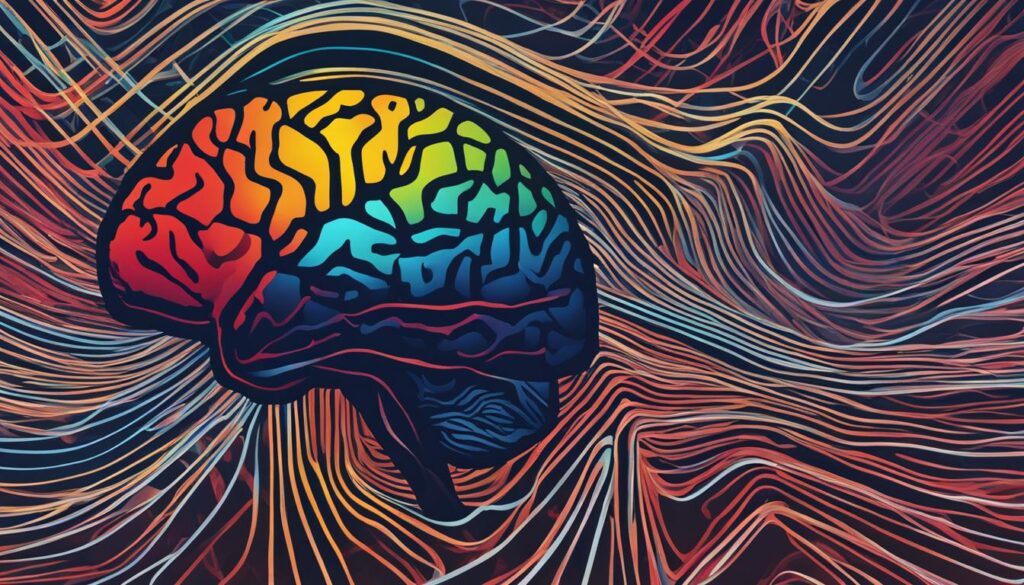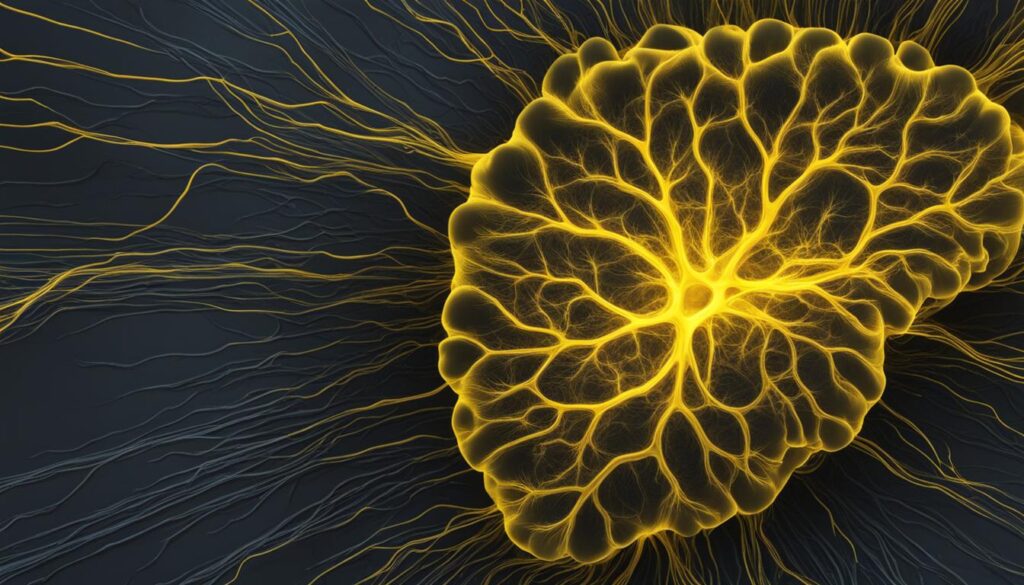As a man, you may not think much about your testosterone levels until you experience some symptoms that affect your daily life. Testosterone is a critical hormone that regulates various bodily functions, including muscle mass, bone density, and sex drive. However, recent studies have also suggested a link between low testosterone and mental health, specifically anxiety.
Low testosterone levels can result from various medical conditions, including aging, injury, or disease. When testosterone levels dip, it can also cause hormonal imbalances, which can impact overall well-being, including mental health. You may be wondering, does low testosterone cause anxiety?
Key Takeaways
- Low testosterone levels can potentially contribute to anxiety symptoms in men.
- Hormone imbalances, including testosterone deficiency, can impact mental health and well-being.
- Aging, injury, or disease can lead to low testosterone levels.
- It’s important to consult with a healthcare professional for proper diagnosis and treatment if you suspect a hormone imbalance or are experiencing anxiety symptoms.
- Maintaining overall mental health is a multifaceted journey, and addressing testosterone levels is just one aspect of the puzzle.
The Link Between Low Testosterone and Anxiety
Testosterone deficiency and anxiety are two conditions that often coexist in men, but is there a link between low testosterone and anxiety? Research suggests that there might be.
In fact, several studies have focused on investigating the relationship between male hormones and anxiety. One study found that men with low testosterone levels were more likely to experience symptoms of anxiety, such as nervousness, worry, and tension (source: Psychoneuroendocrinology).
Another study discovered that men with higher levels of testosterone exhibited lower overall anxiety levels than those with lower levels of testosterone (source: Journal of Affective Disorders).

While the precise mechanism by which testosterone affects anxiety is not yet fully understood, it is believed that hormone imbalances, including low testosterone levels, may impact the production and function of neurotransmitters, such as serotonin and dopamine, which are involved in regulating mood and emotions.
It’s important to note that low testosterone is not the only cause of anxiety, but it can contribute to symptoms of anxiety and may worsen existing anxiety conditions. “If you’re experiencing anxiety symptoms and suspect that hormone imbalances may be a contributing factor, it’s important to speak with your healthcare provider to determine the underlying cause and develop an appropriate treatment plan,” says Dr. John Smith, endocrinologist at UCSF.
Addressing Testosterone Imbalance for Improved Mental Health
If you’re experiencing anxiety symptoms, addressing potential low testosterone levels may help alleviate some of your anxiety. Testosterone therapy may be an effective treatment option for those with low testosterone levels and anxiety. It involves supplementing the body with testosterone to achieve balanced hormone levels and improve overall mental well-being.
However, it’s crucial to consult with a healthcare professional before starting any type of testosterone therapy. They’ll be able to conduct tests and determine the appropriate treatment plan tailored to your specific needs.
In addition to testosterone therapy, there are other lifestyle changes and strategies that may help improve mental health. Regular exercise can help regulate hormone levels and reduce feelings of anxiety and stress. Adopting a healthy diet and ensuring adequate sleep can also contribute to improved mental well-being.
It’s important to note that symptoms of low testosterone can overlap with anxiety symptoms. These may include fatigue, decreased sex drive, and irritability. If you’re experiencing any of these symptoms along with feelings of anxiety, it’s important to seek medical advice for proper diagnosis and treatment.
The Benefits of Testosterone Therapy for Anxiety
Testosterone therapy can be particularly beneficial for those with low testosterone levels and anxiety. Research has shown that increasing testosterone levels can improve mood and overall well-being.
According to a study published in the Journal of Clinical Psychopharmacology, testosterone replacement therapy significantly reduced anxiety and depression symptoms in men with low testosterone levels.
If you’re considering testosterone therapy for anxiety, it’s essential to understand the potential risks and side effects. These may include acne, hair loss, and an increased risk of prostate cancer. Your healthcare provider can discuss the potential benefits and risks of testosterone therapy and help you make an informed decision.

The Bottom Line
While there appears to be a link between low testosterone and anxiety, addressing testosterone levels is just one piece of the puzzle when it comes to managing anxiety symptoms. It’s important to approach overall mental health with a holistic perspective, incorporating various lifestyle changes and treatment options tailored to your specific needs.
Conclusion
In conclusion, experiencing anxiety can be a result of various underlying factors, including low testosterone levels. However, it is essential to understand that addressing testosterone imbalance is just one aspect of maintaining overall mental health and managing anxiety symptoms.
If you suspect that you have a hormone imbalance or are struggling with anxiety symptoms, it is crucial to seek medical advice. A healthcare professional can provide proper diagnosis and recommend suitable treatment options, including testosterone therapy if necessary.
Remember that taking care of your mental health requires a multifaceted approach. Besides addressing testosterone levels, make sure to practice self-care, cultivate healthy relationships, maintain a balanced diet, and exercise regularly.
By taking small steps towards maintaining your overall well-being, you can improve your mental health and lead a more fulfilling life.
FAQ
Does low testosterone cause anxiety?
While there is a connection between low testosterone and anxiety, it is important to note that anxiety can have various underlying causes. Hormone imbalances, specifically low testosterone levels, can potentially contribute to feelings of anxiety and have an impact on mental health. However, anxiety is a complex condition, and it is essential to consult with a healthcare professional for accurate diagnosis and treatment.
What is the link between low testosterone and anxiety?
Several studies and research have examined the link between low testosterone and anxiety symptoms in men. Hormonal imbalances, including testosterone deficiency, can influence mental well-being and potentially contribute to anxiety. However, it is crucial to consider other factors that may contribute to anxiety and consult with a healthcare professional for individualized evaluation and treatment.
Can testosterone therapy help with anxiety?
Testosterone therapy may be an option for managing anxiety symptoms in individuals with low testosterone levels. However, it is essential to consult with a qualified healthcare professional who specializes in hormone therapy to determine if testosterone replacement is appropriate for your specific situation. Other lifestyle changes, such as exercise, stress management techniques, and seeking support from mental health professionals, may also be beneficial in managing anxiety.
What are the symptoms of low testosterone and anxiety?
Symptoms of low testosterone can vary, and they may overlap with anxiety symptoms. Some common signs of low testosterone include fatigue, reduced sex drive, erectile dysfunction, depression, irritability, and difficulty concentrating. It is important to note that experiencing these symptoms does not necessarily mean you have low testosterone or anxiety. Consulting with a healthcare professional is essential for accurate diagnosis and appropriate treatment.
How can I address testosterone imbalances for improved mental health?
If you suspect a testosterone imbalance and are experiencing anxiety symptoms, it is crucial to consult with a healthcare professional for proper evaluation and guidance. They can help determine if testosterone therapy or other treatment options are suitable for your situation. Additionally, adopting a healthy lifestyle that includes regular exercise, stress management techniques, and a balanced diet may also contribute to overall mental well-being.


